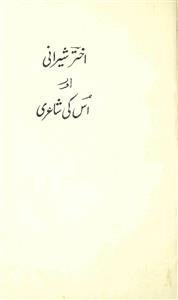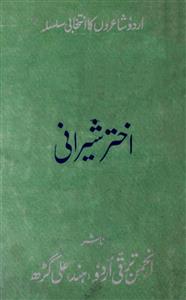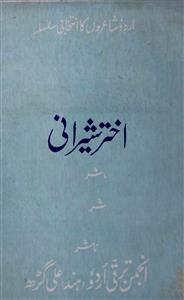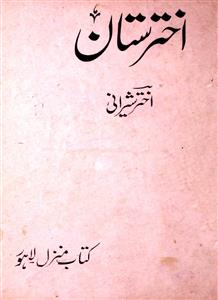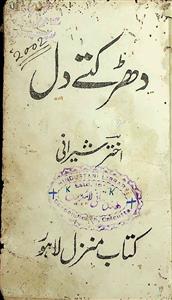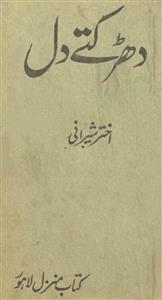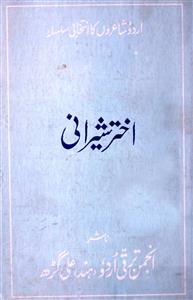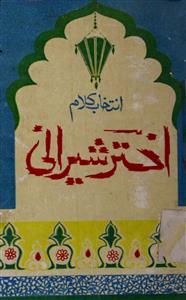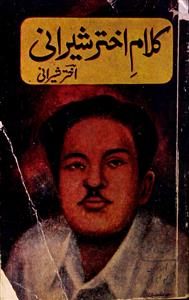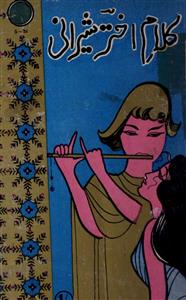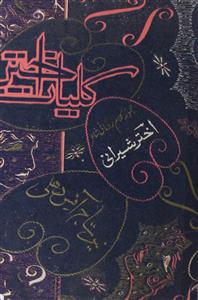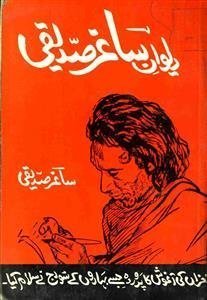 For any query/comment related to this ebook, please contact us at haidar.ali@rekhta.org
For any query/comment related to this ebook, please contact us at haidar.ali@rekhta.org
About The Book
اختر شیرانی کی شاعری شباب ، اس کے رومان اور اس کے حسین خوابوں اور دلکش یادوں کی شاعری ہے۔ ان کا کلام پڑھ کر یہ تاثر پیداہوتا ہے کہ عورت اس کا حسن اور اس کی محبت ہی کانام اس کے نزدیک زندگی ہے۔ اختر شیرانی کی جنت یوں تو سلمیٰ ، یا ریحانہ یا عذرا کی آغوش میں ہے لیکن اس جنت کی تعمیر میں فطرت کا حسن و جمال بھی بڑا اہم عنصر ہے یوں بھی فطرت کی آغوش میں انہیں بڑا سکون ملتا ہے۔ فطرت اور اس کے مناظر و مظاہر کے ساتھ ان کارشتہ محض عشق و شباب ہی کے حوالے سے قائم نہیں ہوتا بلکہ فطرت کی رعنائی اور اس کے مظہراتی حسن و جمال کا ان کی شاعری میں اپنا ایک مقام ہے۔ ان کی شاعری میں جادو کی تاثیر ہے جس میں والہانہ عشق کا اظہار کثرت سے ملتا ہے۔ زیر نظر کتاب میں ان کے آٹھ مجموعوں کے انتخاب کو شامل کیا گیا ہے ۔ ان میں پہلا مجموعہ صبح بہار، دوسرا مجموعہ اختر ستان، تیسرا مجموعہ لالہ طور، چوتھا مجموعہ طیور آوارہ ، پانچواں نغمہ حرم ، چھٹا شہناز، اور آخری مجموعہ کلام شہرود شامل ہے۔ یہ آخری مجموعہ ان کی وفات کے بعد لاہور سے شائع ہوا تھا۔ اس مجموعے میں نعت ، عید کا چاند جیسے موضوعات پر کلام پیش کیا گیا ہے۔ تعارف میں ان کی شخصیت کا مکمل خاکہ کھینچا گیا ہے۔ کتاب کا مطالعہ کرنے کے بعد ان کی فنی شخصیت پورے طور پر کھل کر سامنے آجاتی ہے۔
About The Author
At a time when Urdu literature and criticism was dominated by the progressive movement, Akhtar Shirani’s poetry clearly digressed and made a mark of its own, and was also sidelined due to not fitting in the vogue. Akhtar Sherani's real name was Dawood Khan. He was born on May 4, 1905 in the former Indian state of Tonk. He was the only son of Jaid Alam and Hafiz Mahmood Sherani. Credible guardians and mentors were appointed for religious education and in order to benefit from the conventional education, the father himself acted as a teacher and also got the services of Sabir Ali Shakir. Not only this, he hired wrestler Abdul Qayyum Khan for his son's physical development. Dawood Khan learned the art of writing as well as wrestling. Although his father wanted him to become a scholar, Akhtar had a romantic temperament, and a bent towards poetry. When Akhtar Sherani was about 16 years old, a revolt broke out against the Nawab of Tonk, as a result of which the Nawab deported many people. Among them was Hafiz Mahmood Sherani who had allegedly committed mutiny. He was forced to move to Lahore where Akhtar Sherani, continuing his education, passed the examinations of Munshi-e-Fazal and Adib-e-Fazal from Oriental College and at the same time came under the wing of Allama Tajur Najibabadi in poetry. After graduating, he became involved in journalism and published several magazines in a row. He never worked. All his expenses were the responsibility of his father. Akhtar fell in love in the early days of Lahore. Hafiz Mahmood Sherani was deeply shocked by this news. He did not stop his expenses but ordered that he should never come before him. After the death of his father in 1946, all the responsibilities fell on Akhtar's head, of which he had no experience. His alcohol addiction, too, had aggravated. He went to Lahore to visit his old and sincere friend Nayyar Wasti. By then, smoking had destroyed his liver and lungs. He died on September 9, 1948, in a state where he had no one of his own.
It is important to keep Akhtar Sherani's literary philosophy in mind when examining his literary contributions. Akhtar sang love songs, making Salma a metaphor for the beauty of life. The Salma who was both a living being and a metaphor for beauty. But to call Akhtar Sherani a poet of beauty (even if you don't limit her to feminine beauty) and love is an injustice to him. However, it is also true that the way Akhtar introduced Urdu poetry to the role of a woman, no one had done it before him. His first collection, ‘Phulon Ke Geet’, is a milestone in children's literature. Other poets have also written nominal poetry for children, usually based on either translations or popular anecdotes. An entire collection, largely natural, is Akhtar's greatest achievement. The second collection, Kalam-e-Haram, also contains poems for women and children. Akhtar Sherani also rendered valuable experiences in form. His works in prose, too, aren’t few by any means. He published several magazines. In 1925, when Akhtar Sherani was only 20 years old, he took over the editorship of Lahore High Court’s judge Maulvi Ghulam Rasool's magazine. At the request of Allama Tajur Najibabadi, Pandit Ratan Nath Sarshar's Fasana-e-Azad was redone by Akhtar especially for children. He adapted the Turkish playwright Sami Bay's play "Cave", into Urdu as ‘Zahhak’. He published a collection of fiction called ‘Dhadakta Dil, in which 12 short-stories are translations from other languages and the rest are original. The letters of Akhtar and Salma, of which several editions have been published, are excellent examples of beautiful prose. ‘Aaina-Khaane Mein’ is a collection of his five stories, allegedly written in one night. Akhtar Sherani used to write columns for many newspapers and magazines under pseudonyms like Ibn Batuta I Jahani, Balm, Princess Bakawli, Zabur, Zahak, Akas, Lord Byron of Rajasthan, Masood Khosrow Sherani, Mullah Furqan etc. Whether Akhtar Sherani a great poet or not is still contentious, but there is no doubt that even the shortest history of Urdu literature would be incomplete without his mention.
 For any query/comment related to this ebook, please contact us at haidar.ali@rekhta.org
For any query/comment related to this ebook, please contact us at haidar.ali@rekhta.org
